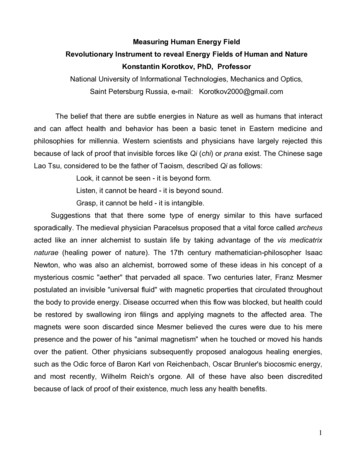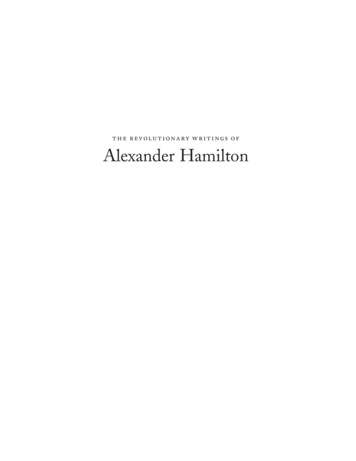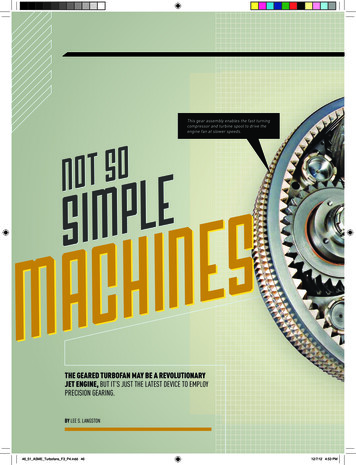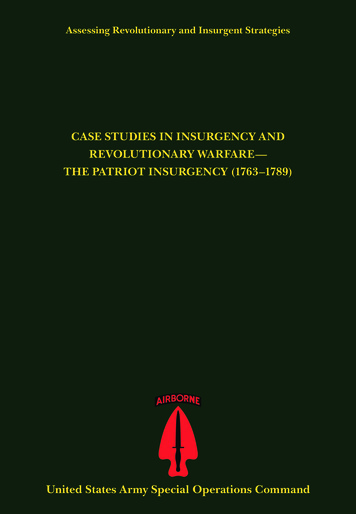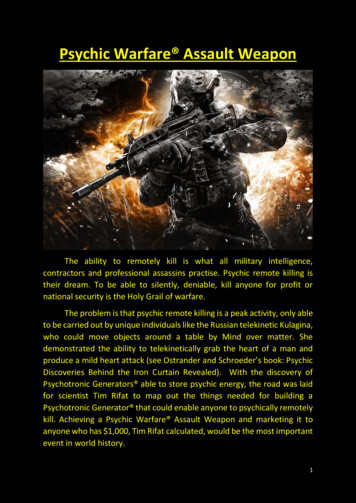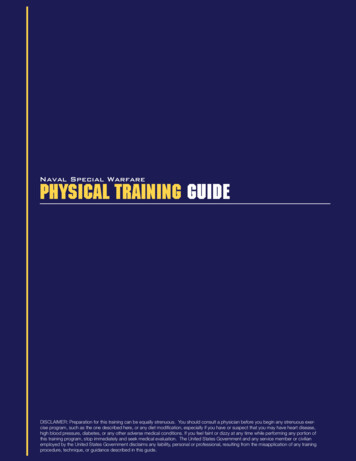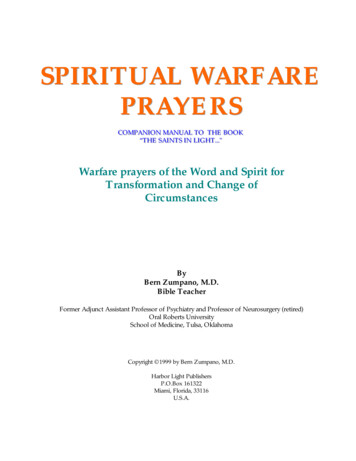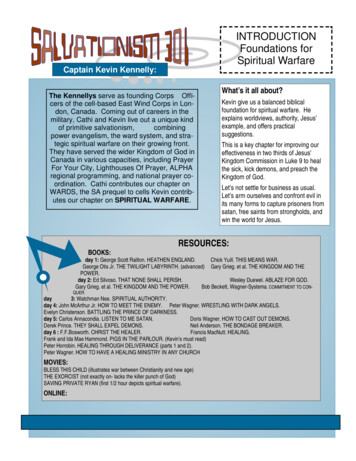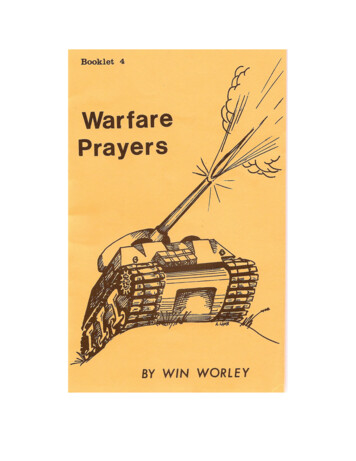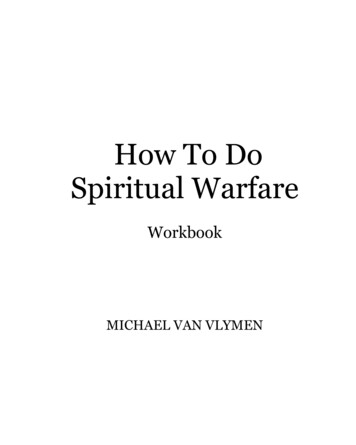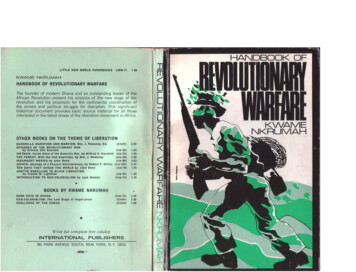
Transcription
HANDBOOKofREVOLUTIONARYWARFAREA Guide to the Armed Phase of theAfrican RevolutionINTERNATIONAL PUBLISHERSNew York
ToThe African GuerrillaCopyright by Kwame Nkrumah, 1968ALL RIGHTS RESERVEDFirst United States Edition, 1969Printed in the United States of AmericaPUBLISHER'S NOTEThe Handbook of Revolutionary Warfare was publishedtoward the end of 1968 by Panaf Books, Ltd., London. Asignificant historical document, it provides basic source material for the study of the new phase of the African Revolution.Within the present decade guerrilla warfare has emergedas a new feature of the liberation movement in those areas ofSouthern Africa dominated by white racial minorities. Beginning with the launching of armed struggles in the Portuguese colonies of Angola, Guinea Bissau and later inMozambique, it appeared also in Southwest Africa and morerecently in the Union of South Africa and Rhodesia. OtherAfrican countries have helped train and supply the guerrillaforces, while preparations for similar movements seem to beunder way elsewhere in Africa.Although each of these liberation movements have theirspecific features and their own leaderships, there is present astrong tendency toward the coordination of their efforts, inface of the supra-national oppressive military role being assumed by the apartheid oligarchy of South Africa and theintervention of the neo-colonial powers. A formal coordinating body already exists for the struggles in the Portuguesecolonies and the movements in Rhodesia and South Africaare coordinated through their respective organizations. In theHandbook, President Kwame Nkrumah presents his analysisof the new stage of the African Revolution and his proposalsfor anti-imperialist coordination on a continental scale.
AUTHOR'S NOTEThis book has been written during my stay in Conakry.Previous notes I made for a manual of guerrilla warfarefor African freedom fighters were left behind in Ghanawhen I departed for Hanoi on 21st February 1966. Themanuscript was handed over to imperialist and neocolonialist intelligence organisations by the military andpolice traitors.This HANDBOOK, presenting a completely new approachwill, I hope, help to make possible the successful completionof the armed phase of the African revolutionary strugglefor total emancipation and an All-African Union Government.The Black Power movement in the U.S.A., and thestruggles of peoples of African descent in the Caribbean,South America and elsewhere, form an integral part of theAfrican politico-military revolutionary struggle. Our victorywill be their victory also, and the victory of all the revolutionary, oppressed and exploited masses of the world whoare challenging the capitalist, imperialist and neo-colonialistpower structure of reaction and counter-revolution.Conakry, Guinea.30th July 1968.
RULES OF DISCIPLINE1.Obey orders in all your actions.2.Do not take a single needle or piece of thread from themasses.3.Turn in everything captured.4.Speak politely.5.Pay fairly for what you buy.6.Return everything you borrow.7.Pay for anything you damage.8.Do not hit or swear at people.9.Do not damage crops.10.Do not take liberties with women.11.Do not ill-treat captives.12.Keep your eyes and ears open.13.Know the enemy within.14.Always guide and protect the children.15.Always be the servant of the people.
CONTENTSPAGEBOOK ONE—KNOW THE ENEMY1PREFACECHAPTER ONETHE WORLD STRATEGY OFI MPERIALISM1Know the enemy—Collective imperialism—Sham independence—Neo-colonialism—Thestruggle against neo-colonialism—Propaganda and psychological warfare—Foreignmilitary preparedness—The need for PanAfrican organisation.CHAPTER TWOOUR OBJECTIVES24Nationalism — Pan-Africanism — Socialism—The present stage of the liberation struggle—Accumulated experience of the Africanpeople's unity movement—Sham independence and the unity movement—Africanpeople's wars and imperialist escalation—The Organisation of African Unity—Someessential features of the enemy's offensive—The need for self-critical objective diagnosis.
workers' movement and revolutionary strategy—The role of students—The nationalistbourgeoisie—Revolutionary outsiders—Therole of women—Women in enemy-held zones—Women in the bases and liberated areas—The training of women.BOOK TWO—STRATEGY, TACTICS ANDTECHNIQUESPAGEPREFACE42CHAPTER ONEORGANISATION FOR REVOLUTIONARY WARFAREA.THE MILITARY BALANCE43Liberated areas—Zones under enemy control— Contested zones — Retarding factors —High command—The need for co-ordinatedrevolutionary action.B.POLITICO-MILITARYORGANISATION56The All-African People's Revolutionary Party( AAPRP) and the All-African Committeefor Political Co-ordination (AACPC)—TheAll-African People's Revolutionary Army(AAPRA) — AAPRA headquarters — TheAACPC and our revolutionary strategy—The army corps—AAPRA's structure andstrategy—Equipment and composition of thearmed forces—Recruitment—General principles of training—Physical training—Technical training—Political education—Leadership.C.OUR HUMAN FORCES75The peasants—The rural proletariat—Neocolonialist control over the advanced sectorsof production—Workers in the mines, industries and trade—Neo-colonialist attempts atintegration—The truth behind the salariesThe failure of imperialist tactics—ThePAGED.95PROPAGANDAPropaganda to subvert the enemy—Propaganda addressed to the people—Suggestionsfor propaganda items.CHAPTER TWOBASIC PRINCIPLES AND TECHNIQUESOF GUERRILLA WARFAREA. ORGANISATION OF A GUERRILLA103ARMYRecruitment — Information — Operations—Sabotage — Instruction — Armament —Provisions — Health — Propaganda — Volunteers — Communications — Guerrilla units— Guerrilla unit and group leadersTraining — Equipment.108B. STRATEGY AND TACTICSMobility—Concentration and dispersal offorces—Bases—Choice of objectives for attack— Combat in favourable terrain—Combat inunfavourable terrain — Villages — Towns —Discipline — Reconnaissance — Prisoners —Camouflage—Acquisition of arms—Storageof arms — Espionage — Enemy spies and
infiltrators — Enemy attack — Sabotage —Attacking a village—Dead and wounded—Defence of an occupied village—Relationsbetween guerrillas and civilians—Politicalwork—Civilian organisations.PAGEC. MATERIALS FOR DESTRUCTION122The guerrilla is the masses in arms
BOOK ONEKNOW THE ENEMYPREFACEThe new phase of the armed revolutionary struggle in Africaembraces the entire continent. It is essential that we knowwhat we fight, and why we fight. Imperialism and neocolonialism must be broken down into their componentparts so that we can clearly see them. We must know theirworld strategy.In this book I have attempted to show the nature andextent of imperialist and neo-colonialist aggression, and ourobjectives in the struggle for the freedom and the politicalunification of Africa.CHAPTER ONETHE WORLD STRATEGY OF IMPERIALISMKnow the enemyA number of external factors affect the African situation,and if our liberation struggle is to be placed in correct perspective and we are to KNOW THE ENEMY, the impactof these factors must be fully grasped. First among them isimperialism, for it is mainly against exploitation andpoverty that our peoples revolt. It is therefore of paramountimportance to set out the strategy of imperialism in clearterms :1. The means used by the enemy to ensure the continuedeconomic exploitation of our territories.2. The nature of the attempts made to destroy the liberation movement.Once the components of the enemy's strategy are deter1
mined, we will be in a position to outline the correct strategyfor our own struggle in terms of our actual situation andin accordance with our objectives.Before the Second World War, the world (excluding theUSSR, China, etc.) was divided into :(a) Capitalist states practising orthodox imperialismunder the generally known form of imperialism.(b) Colonial territories which fed the economies of thecapitalist imperialist states. (The Latin Americanterritories had already passed from the status of"Spanish" and "Portuguese" colonies to that of neocolonies.)However, after the Second World War, serious economic,social and political tensions arose in both spheres.(a) Inside the capitalist-imperialist states, workers'organisations had become comparatively strong andexperienced, and the claims of the working class fora more substantial share of the wealth produced bythe capitalist economy could no longer be ignored.The necessity to concede had become all the more imperative since the European capitalist system hadbeen seriously shaken up by the near-holocaust whichmarked the experience of imperialist wars.(b) While the capitalist system of exploitation was comingto grips with its internal crises, the world's colonisedareas were astir with the upsurge of strong liberationmovements. Here again, demands could no longer becast aside or ignored especially when they were channelled through irresistible mass movements, like theRassemblement Democratique Africain (RDA),the Parti Démocratique de Guineé (PDG) and theConvention Peoples' Party (CPP) in Ghana. Incertain areas, for example in Vietnam, Kenya andAlgeria, direct confrontation demonstrated the readiness of the oppressed peoples to implement theirclaims with blood and fire.Both in the colonial territories and in the metropolitanstates, the struggle was being waged against the sameenemy : international finance capital under its external andinternal forms of exploitation, imperialism and capitalism.Threatened with disintegration by the double-fistedattack of the working class movement and the liberationmovement, capitalism had to launch a series of reforms inorder to build a protective armour around the innerworkings of its system.To avoid an internal breakdown of the system under thepressure of the workers' protest movement, the govern-
ments of capitalist countries granted their workers certainconcessions which did not endanger the basic nature of thecapitalist system of exploitation. They gave them socialsecurity, higher wages, better working conditions, professional training facilities, and other improvements.These reforms helped to blur fundamental contradictions,and to remove some of the more glaring injustices while atthe same time ensuring the continued exploitation of theworkers. The myth was established of an affluent capitalistsociety promising abundance and a better life for all. Thebasic aim, however, was the establishment of a "welfarestate" as the only safeguard against the threat of fascismor communism.However, the problem was to find a way to avoid sacri-ficing the all-important principle of ever-increasing profitsfor the owning minority, and also to find the money neededto finance the welfare state.By way of a solution, capitalism proceeded to introducenot only internal reforms, but external reforms designed toraise the extra money needed for the establishment and themaintenance of the welfare state at home. In other words,modern capitalism had come to depend more heavily thanbefore on the exploitation of the material and human resources of the colonial territories. On the external front,therefore, it became necessary for international financecapital to carry out reforms in order to eliminate thedeadly threat to its supremacy of the liberation movement.The urgent need for such reforms was made clear by thepowerful growth and expansion of the liberation forces inAfrica, Asia and Latin America, where revolutionary movements had not only seized power but were actually consolidating their gains. Developments in the USSR,China, Cuba, North Vietnam, North Korea, and inEgypt, Ghana, Guinea, Mali, Algeria and other parts ofAfrica, showed that not only was the world balance of forcesshifting, but that the capitalist-imperialist states were confronted with a real danger of encirclement.Collective imperialismThe modifications introduced by imperialism in its strategywere expressed :(a) through the disappearance of the numerous oldfashioned "colonies" owing exclusive allegiance to asingle metropolitan country.(b) through the replacement of "national" imperialismsby a "collective" imperialism in which the USAoccupies a leading position.
The roots of this process may be traced back to the periodof the Second World War, when the socialist camp wasstill too small and weak to give decisive assistance to theEuropean working class movement. The workers weretherefore all the more easily deflected from the objectivesof their struggle, and allowed themselves to be dragged intoa bloody war of imperialism.The Second World War seriously strained the politicaland economic strength of Europe, although capitalism as asystem emerged relatively intact. However, the true winnerof the whole contest turned out to be the United States ofAmerica. Having helped the allies to win the war, the USAwas from then on able to retain its pre-eminent position,and to acquire increasing influence in the economic life ofthe exhausted European states.This "internationalisation" or "syndicalisation" enabledUS imperialism to forestall temporarily an incipientcrisis by fulfilling two sin qua non conditions :I. The need to expandThe US-European post-war alliance not only enabledthe USA to benefit from the advantages of the European market, which had hitherto been largely closedto its penetration; but also opened up new horizons inAsia, Africa, and Latin America where the USAhad already superceded European supremacy andestablished neo-colonialist domination.2. The need to militariseThe militarisation of the US economy, based onthe political pretext of the threatening rise of theUSSR and later of the People's Republic of China associalist powers, enabled the USA to postpone its internal crises, first during the "hot" war (1939-1945)and then during the "cold" war (since 1945) .6Militarisation served two main purposes :1. It absorbed, and continues to absorb, an excess ofunorganised energy into the intense armaments drivewhich supports imperialist aggression and many blocsand alliances formed by imperialist powers over thelast twenty years.2. It made possible an expensive policy of paternalistcorruption of the poor and oppressed people of theworld.The principle of mutual inter-imperialist assistancewhereby American, British, French and West Germanmonopoly capital extends joint control over the wealth ofthe non-liberated zones of Africa, Latin America and Asia,finds concrete expression in the formation of interlockedinternational financial institutions and bodies of credit:International Monetary Fund (IMF), USA 25% of thevotes.International Bank for Reconstruction and Development(IBRD), USA 34% of the votes.International Development Association (IDA), USA41% of the votes.On a lesser scale, Europe as a whole, and West Germanyin particular, find profitable outlets for big business inAfrica through the agencies of such organisations as theEuropean Common Market (EEC).The imperialists even make use of the United NationsOrganisation in order to camouflage their neo-colonialistobjectives. This can be seen, for example in US policy inSouth Korea and the Congo.Sham independenceBut as far as the imperialists are concerned the real solution to the problem of continued exploitation through con7
cessions and reform lies in the concept of "sham-independence". A state can be said to be a neo-colonialist or clientstate if it is independent de jure and dependent de facto.It is a state where political power lies in the conservativeforces of the former colony and where economic power remains under the control of international finance capital.In other words, the country continues to be economicallyexploited by interests which are alien to the majority ofthe ex-colonised population but are intrinsic to the worldcapitalist sector. Such a state is in the grip of neocolonialism. It has become a client state.Neo-colonialism2. That capitalism, free enterprise, free competition,etc., are the only economic systems capable of promoting development; that the western powers havemastered the liberal-capitalist technique perfectly;that the colonial territory should become an economicsatellite in its own interest; that there is no reason toput an end to the policy of "co-operation" pursuedduring the colonial regime; and that any attempt tobreak away would be dangerous, since the colonialpower is always ready to give "aid".3. That the slightest "lapse" on the part of the leadersof the liberation movement could push the countryinto the grip of "communism" and of "totalitariandictatorship".4. That the carve-up agreed upon by the imperialistsduring the colonial period is fair and sacred; that itwould be unthinkable even to attempt to liberate areasin terms of their common cultural and historical links;that the only acceptable version of "liberation" mustapply to the artificial units designed by the imperialists, and hurriedly labelled "nations" in spite of thefact that they are neither culturally unified, noreconomically self-sufficient.As a further justification of its policy, i mperialism usu-The pre-requisite of a correct and global strategy to defeatneo-colonialism is the ability to discover and expose theway in which a state becomes neo-colonialist. For althougha neo-colonialist state enjoys only sham independence it isto all outward appearances independent, and therefore thevery roots of neo-colonialism must be traced back to thestruggle for independence in a colonial territory.If the liberation movement is firmly established, the colonial power invariably resorts to a "containment" policyin order to stop any further progress, and to deaden itsimpact. To achieve this objective, the colonial power usesits arsenal of alliances, its network of military bases, economic devices such as corruption, sabotage and blackmail,and equally insidious, the psychological weapon of propaganda with a view to impressing on the masses a number ofimperialist dogmas :ally resorts to all types of propaganda in order to highlightand exploit differences of religion, culture, race, outlook,and of political ideology among the oppressed masses, orbetween regions which share a long history of mutualcommercial and cultural exchange.1. That western democracy and the parliamentarysystem are the only valid ways of governing; thatthey constitute the only worth-while model for thetraining of an indigenous élite by the colonial power.Such methods aim to orientate the leaders of the liberation movements towards a brand of nationalism based onpetty-minded and aggressive , chauvinism, as well as to steerthe liberation movement along a reformist path. The prob-
lem of "liberation" is therefore usually raised in terms ofa participation of "good" indigenous elements in theadministration of the colonised territory, for instancethrough a policy of "africanisation" devoid of any fundamental changes in the political, economic and administrativestructure of the territory.The transition to neo-colonialism is marked by a succession of more or less important measures which culminateinto a ritual of so-called free elections, mostly organisedthrough methods of intimidation. Local agents, selected bythe colonial power as "worthy representatives" are thenpresented to the people as the champions of national independence, and are immediately given all the superficialattributes of power : a puppet government has been formed.By the very nature of its essential objective, which isexploitation, neo-colonialism can only flourish in a clientstate.When the farce of sham elections to form a puppet government proves too difficult to enact, the colonial powertries to divide the liberation movement into a "moderate"wing with which it seeks accommodation, and a militantwing which it endeavours to isolate and to suppress byforce.In the last resort, neo-colonialists can even set up a bogus"progressive" party or organisation using local agents andmaintain an artificial liberation movement which servesboth as a worthy partner for negotiations and as an intelligence and/or repression agency against the genuine liberation movement supported by the oppressed masses. Suchis the role played by FLING in regard to Guinea-Bissao,and UPA in regard to Angola. And so once more the stageis set for negotiations, autonomy and the formation of apuppet government.10However, the machinations of the colonial power will failwherever the leaders of the struggle for independence maintain a clear spirit of vigilance, and cultivate genuinelyrevolutionary qualities.Then, and only then, does a truly independent government emerge, dedicated to national reconstruction inthe liberated territory, and determined to assist all thoseengaged in anti-imperialist struggle.Such a government is an obstacle barring the advance ofneo-colonialism, and such obstacles must be increased because the example of genuine independence is contagiousand will help to fortify extensive zones against imperialistaggression.Faced with genuine independence, imperialism is increasingly compelled to resort to encirclement and subversionin order to overthrow these popular governments, usingsuch weapons as coups d'etat, assassination, mutiny withinthe party, tribal revolt, palace revolutions, and so on, whileat the same time strengthening neighbouring puppetregimes to form a political safety belt, a cordon sanitaire.Therefore, the main sphere in which we must strive todefeat neo-colonialist intrigues is within the movement fortrue independence; that is, within the progressive politicalparty which forms the government. This is particularly truein the one party state which can only function successfullyunder socialism. Usually, this ruling party is made upof several groups each with its distinct economic and political interests. The relative importance of each group in theparty and state machinery will determine the course of development. Imperialist strategy is therefore directedtowards bringing into a position of pre-eminence that groupwhich most nearly shares its economic and political views.If a member of a group which is absolutely opposed to11
imperialism is in control of the state and party, attemptsare made to organise :Either1. Assassination or a coup d'état or "palace revolution" which will permit political power to fall intothe lap of the rival but pro-imperialist group.Or2. A decentralisation of political power within the rulingparty, one group being strong in the state machinery,the other strong in the party machine. Even in thestate machine, the vital organs are artfully put intothe hands of forces ready to parley with imperialists.The nursing of discontent and confusion within theparty and among the people, through the spread ofconflicting ideologies, rumours of economic rundown, maladministration and corruption, will permit the creation of an atmosphere of dissatisfactionfavourable to a change in the personnel of government. Ostensibly the same party is in power. Intruth, a qualitative change in the nature of politicalpower has taken place.Since the conglomerate nature of the ruling party is thebasic fact on which neo-colonialist strategy depends, themain remedial measures must be directed to this sphere,and this problem must be borne in mind even before theachievement of independence. It is essential that positiveaction should in its dialectical evolution anticipate theseminal disintegration and discover a way of containingthe future schismatic tendencies.Neo-colonialism constitutes the necessary condition forthe establishment of welfare states by the imperialistnations. Just as the welfare state is the internal condition,hegemony of international finance capital.It is precisely the increasing dependence of the imperialistsystem on neo-colonialist exploitation on an internationalscale which renders its existence so precarious, and its futureso uncertain.neo-colonialism is the external condition, for the continuedSignificantly, the neo-colonialist system costs the capitalist powers comparatively little, while enormous and increasing profits are made. This is shown by the ever-risinggraphs representing the turn-over figures of the big capitalistbusiness concerns implanted in the neo-colonialist areas ofthe world, and by the ever-widening gap between thewealthy and the poor peoples of the world.In the final analysis, the neo-colonialist system of exploitation, which is the external condition for the maintenance1213
of the capitalist welfare state, remains essentially dependenton the production of the neo-colonised workers, who mustnot only continue to produce under stagnant and continually worsening living conditions, but must produce substantially more than they did in the colonial days. Theymust do more than satisfy the needs of the metropolitanstate. They must cater for the insatiable demands of theclient government.The explosive character of this situation cannot bedenied. The neo-colonialist government is virtually in astate of permanent conflict with its own masses, whilst thegap between the puppet administration and neo-colonisedworkers widens every day.It is therefore clear that a puppet regime cannot draw itsstrength from the support of the broad masses. It can onlystay in power as long as it manages to subsist in the teethof popular opposition and revolt. Hence, the imperativeneed to depend on a foreign power for military assistancemerely to keep the neo-colonised government physically inpower.Thus, the three essential components of neo-colonialismare :1. Economic exploitation2. Puppet governments and client states3. Military assistance4. Economic "aid"The vital necessity of "military aid" is fulfilled throughvarious channels : foreign technical assistance to the armedforces, control of the armed forces by officers and westernmilitary cadres, secret military agreements, the formationof special units for the repression of popular insurrection,and so on. The important thing is to know how to recognisethis type of "aid", in whatever guise it appears, for it isthe most blatant proof of the anti-popular, aggressive andbasically violent character of all neo-colonialist regimes. Itsescalation and impact increase proportionately to the widening gap between the puppets and the oppressed masses, andit is directly related to the development of organised,popular resistance.It is also to be noted that US policy found its mostcomplete expression, after the murder of PresidentKennedy, in the Johnson doctrine whereby military aggression, under the name of "preventive measures", became anintegral part of neo-colonialist practice.The struggle against neo-colonialismMilitary strategy presupposes political aims. All military15
problems are political, and all political problems areeconomic.Both the basic nature of neo-colonialism and the accumulated experience of liberation movements in Africa, Asiaand Latin America indicate clearly that the only way forthe broad masses to eradicate neo-colonialism is througha revolutionary movement springing from a direct confrontation with the imperialists, and drawing its strength fromthe exploited and disinherited masses. The struggle againstpuppet governments, and against all forms of exploitation,is the basic condition for the survival and development ofa genuine liberation movement in Africa. We must acceptthe challenge and fight to destroy this threat to our futureas a free and united continent.Independence must never be considered as an end in itself but as a stage, the very first stage of the people's revolutionary struggle.Propaganda and psychological warfareThroughout the struggle we must recognise and combatenemy attempts to demoralise us. For, in the face of thefailure to achieve military solutions against well-organised,broadly-based guerrilla forces, as for example in Vietnam,the enemy has stepped up its efforts in the propaganda war.The aim is:1. To prevent a liberation movement from getting underway, by destroying it at its source, i.e. by undermining the will to fight.2. Where revolutionary warfare has actually begun, toconquer it by political means, i.e. by granting justsufficient political, economic and social "reform" toencourage all but the so-called "extremists" to abandon the struggle.16Psychological attacks are made through the agency ofbroadcasting stations like the BBC, Voice of Germany,and above all, Voice of America, which pursues its brainwashing mission through newsreels, interviews and other"informative" programmes at all hours of the day andnight, on all wavelengths and in many languages, including"special English". The war of words is supplemented bywritten propaganda using a wide range of political devicessuch as embassy bulletins, pseudo "revolutionary" publications, studies on "nationalism" and on "African socialism", the literature spread by the so-called independentand liberal publishers, "cultural" and "civic education"centres, and other imperialist subversive organisations.The paper war penetrates into every town and village,and into the remotest parts of the "bush". It spreads in theform of free distributions of propaganda films praising thequalities of western civilisation and culture. These are someof the ways in which the psychological terrain is prepared.When the target, a certain country or continent, is sufficiently "softened", then the invasion of evangelist brigadesbegins, thus perpetuating the centuries old tactic wherebymissionaries prepare the way for guns. Peace Corps divisions stream in, and Moral Rearmament units, Jehovahwitnesses, information agencies and international financial"aid" organisations.In this way, a territory or even an entire continent isbesieged without a single marine in sight. A sprinkling ofpolitical and little-publicised murders, like that of PioPinto in Kenya, and Moumié in Geneva, are used to assistthe process.A recent development in the psychological war is thecampaign to convince us that we cannot govern ourselves,that we are unworthy of genuine independence, and that17
foreign tutelage is the only
This book has been written during my stay in Conakry. Previous notes I made for a manual of guerrilla warfare for African freedom fighters were left behind in Ghana when I departed for Hanoi on 21st February 1966. The manuscript was handed over to imperialist and neo-colonialist intell
